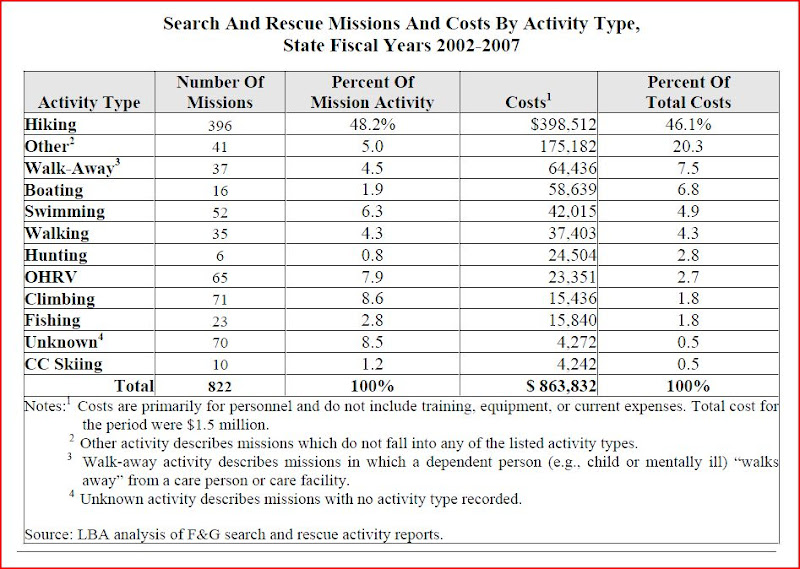sierra
Well-known member
Those who hunt are not Huntermen. Those who hike are not Hikermen.
angler is reserved for snobby fishermen where Im from.

Those who hunt are not Huntermen. Those who hike are not Hikermen.
Those who hunt are not Huntermen. Those who hike are not Hikermen.
Hunters and Fisherman don't contribute to the SAR fund.
It is now only, OHRV (off highway recreational vehicles) snowmobile and boat registrations are surcharged $1. This does not include canoe or kayaks.
Is that $1 surcharge the ONLY thing that funds SAR ?


Hikers accounted for 0% revenues and 46% expenditures.
Hikers accounted for 0% of direct SAR funding. Hikers certainly contribute revenue to the general fund through rooms and meals taxes.
Tim
Craig said:IMO any statement that addresses balancing of the SAR fund, will need to be easily understandable, clear and concise. Any attempt at creative accounting will be met head on by the interest groups that don't like hikers.
Craig said:The genesis of the issue (IMO) is the legislature established a Fish and Game Department in 1935 using the tradition of “pay for the services you use”. Therefore there is an impregnable mindset (in the legislature) on generating revenues for the SAR fund from the folks that use that service. Right now that stands at 56% hikers.
And fisher is a perfectly good term for one who fishes. But not one I've ever heard someone engaged in fishing (or angling) use. Pretty much 100% of the guys I know who fish will say "fishermen", which of course some will argue is not PC.
And those who play the piano are... not pianoerspianists. Ain't English grand?
I guess I'm trying to determine if the $860K number in Craig's chart represents the incremental cost of SAR missions or is just the proportion of F&G's expenses they're allocating to SAR activites, as opposed to fish management activites, wildlife habitat activities, etc. -- i.e., the rest of what F&G does.
Great point, Ellen. I would also suggest that many of us routinely make minor trail improvements - moving loose rocks, or branches, or any one of a bunch of other things which might prevent the next person from turning an ankle and possibly incurring a bigger injury.
Tim
Yes, I know we are, Tim. All the time. Some of us get really proficient at flicking sticks and branches with our hiking poles, and relish kicking out dams in waterbars to watch the water flow freely on our way up. Then we get to see the difference a little kick start has made on our way down from the summit.
That is a very interesting observation, I have come across alot of major puddling on trails, I then clear a path off the trail to drain and upon arriving from my summit, happily notice no more standing water.
No, Craig, I have no emperical data, pie charts, or graphs to prove one way or anotherjust my curiosity and taking a contrarian view.
It sucks trying to sway folks to your contrarian POV when you can't flip out reams of data to support it – don't it?lol
So why has everyone been saying, for years, that SAR is funded by Hunters and Fisherman?Important Note:
In my past posting I have been erroneously stating that Hunters and Fisherman contribute to the SAR fund through their license purchases.
This is not the case under current law.
When the SAR fund was established in 1989 I thought it was originally funded from hunting and fishing licenses also. It appears it has been amended 4 times since 89. I can't find that information now.
Hunters and Fisherman don't contribute to the SAR fund.
It is now only, OHRV (off highway recreational vehicles) snowmobile and boat registrations are surcharged $1. This does not include canoe or kayaks.
Craig said:SAR fund first became insolvent in 2007
It sucks trying to sway folks to your contrarian POV when you can't flip out reams of data to support it – don't it?lol